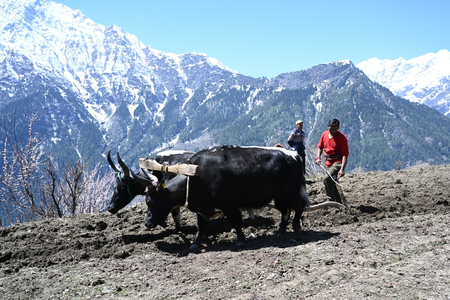
Shimla, July 27 (IANS) In less than four months after recognising mountainous Pangi in Chamba district as Himachal Pradesh’s first natural farming subdivision, 2,244 families have been practising chemical-free farming in the valley.
The state government on Sunday said it is now planning to transition all 2,920 hectares of cultivated land, covering agriculture, horticulture, and other farming areas, to 100 per cent natural farming in the landlocked Pangi Valley.
Locals, largely farmers and shepherds, have welcomed the government to formally declare their area as the first natural farming subdivision. They view the decision as a crucial step towards preserving their traditional farming practices, enhancing food security, and promoting sustainable livelihoods in the remote areas bordering Jammu and Kashmir.
Chief Minister Sukhvinder Sukhu made an announcement in this regard on Himachal Day, April 15.
Raj Kumar, a resident of Dhanvas village in the valley, said, “This decision was long overdue, but it’s encouraging that the state government has finally taken a step to ensure the welfare of the people in this region. We have seen families who leased out their land for cultivation while living outside Pangi now regretting it. The use of chemical-based farming has rendered their land barren.”
Farmers say natural farming has already shown promising results in improving soil health, reducing costs, and restoring ecological balance. They believe the official recognition will bring greater visibility, institutional support, and market opportunities for their unique and naturally grown produce.
Other growers, Sheela Devi and Sunita Kumari from Punto village, said, “We are not in a position to venture into entrepreneurship because we are not very well-off and own only small landholdings. But if we adopt chemical-free farming practices today, we will have something valuable to pass on to the next generations.”
Acting on the Chief Minister’s directive, the Agriculture Department has prepared a detailed roadmap focused on providing handholding support, training, and capacity building for the farmers. The initiative is being rolled out in a phased and decentralised manner. In the first phase, village-level planning, assessments, and mobilisation efforts will be carried out, followed by extensive training programmes and on-ground demonstrations, an official statement said.
To ensure timely access to natural farming inputs, panchayat-level bio-input resource centres (BRCs) will be established, which will supply natural formulations such as ‘beejamrit’, ‘jeevamrit’, ‘dashparni ark’, and ‘agniastra’, etc. They will also function as community hubs for training and knowledge exchange, particularly supporting farmers who do not own cows, which are essential for preparing many of these inputs.
In the later phases, the initiative will focus on infrastructure development, including the construction of poly-houses, cold storage units, and other essential facilities. Additionally, the formation of self-help groups (SHGs), farmer producer organisations (FPOs) and farmer producer companies (FPCs) will be promoted to strengthen farmer institutions and collective bargaining power.
Deepak Kumar, village head of Suraal gram panchayat, said, “This is a major step towards the economic growth of our area, as natural farming produce will fetch fair and remunerative prices for the hard work of our farmers. We are grateful to the state government, especially Chief Minister Sukhvinder Sukhu, for taking a personal interest in uplifting the region’s economy by promoting natural farming in the Pangi Valley.”
–IANS
vg/uk




